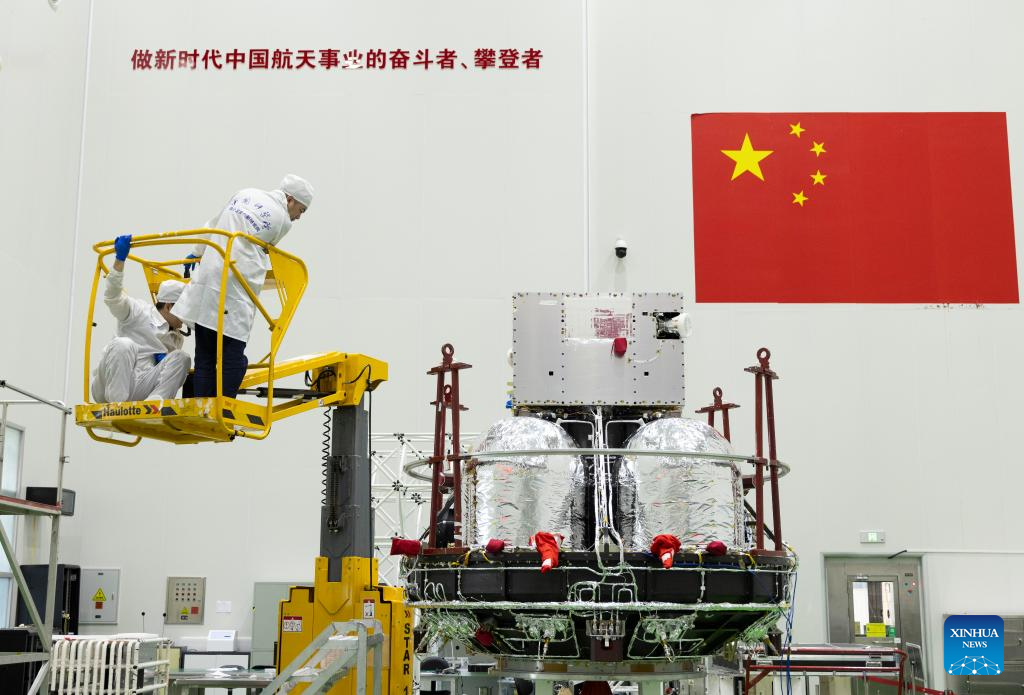
Technicians check the Solar wind Magnetosphere Ionosphere Link Explorer (SMILE) at a workshop of the Innovation Academy for Microsatellites of Chinese Academy of Sciences (CAS) in Shanghai, east China, Nov. 4, 2024. The SMILE is a joint mission between the CAS and the European Space Agency (ESA) that aims to deepen the understanding of the Sun-Earth connection by observing the dynamic interaction between the solar wind and the Earth's magnetosphere.
The SMILE satellite has completed the development work in China, including satellite testing, system interface testing and environmental experiments, according to the National Space Science Center of the CAS.
The SMILE is about to depart for Europe. It is scheduled for launch by the end of 2025 from Europe's space launch site in Kourou, French Guiana, by Arianespace's Vega-C launch vehicle. (Xinhua/Jin Liwang)
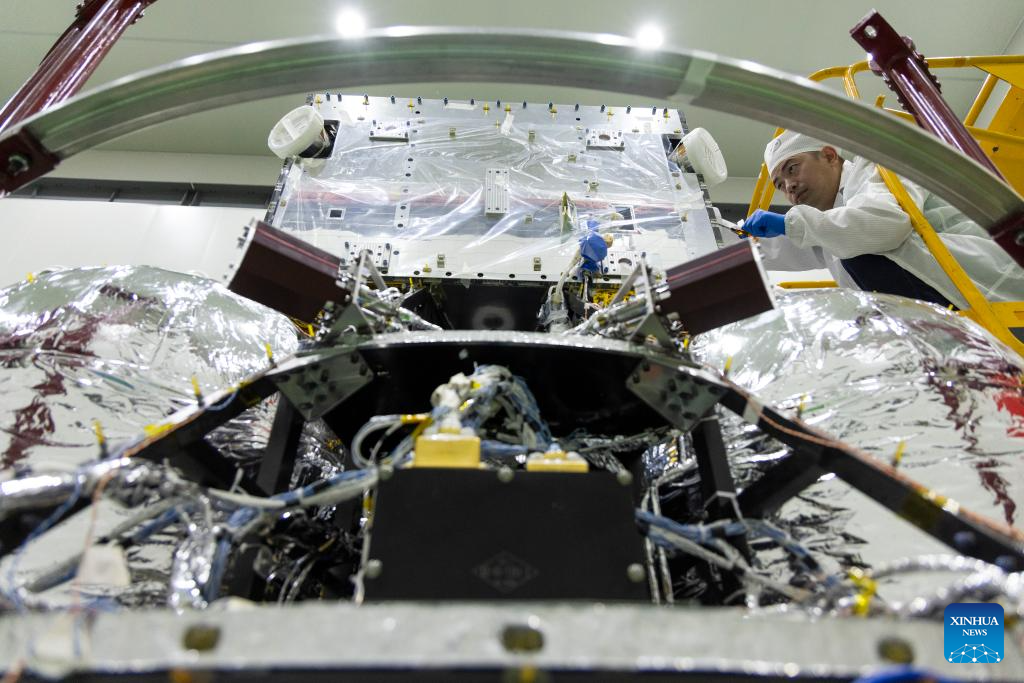
A technician checks the Solar wind Magnetosphere Ionosphere Link Explorer (SMILE) at a workshop of the Innovation Academy for Microsatellites of Chinese Academy of Sciences (CAS) in Shanghai, east China, Nov. 4, 2024. The SMILE is a joint mission between the CAS and the European Space Agency (ESA) that aims to deepen the understanding of the Sun-Earth connection by observing the dynamic interaction between the solar wind and the Earth's magnetosphere.
The SMILE satellite has completed the development work in China, including satellite testing, system interface testing and environmental experiments, according to the National Space Science Center of the CAS.
The SMILE is about to depart for Europe. It is scheduled for launch by the end of 2025 from Europe's space launch site in Kourou, French Guiana, by Arianespace's Vega-C launch vehicle. (Xinhua/Jin Liwang)
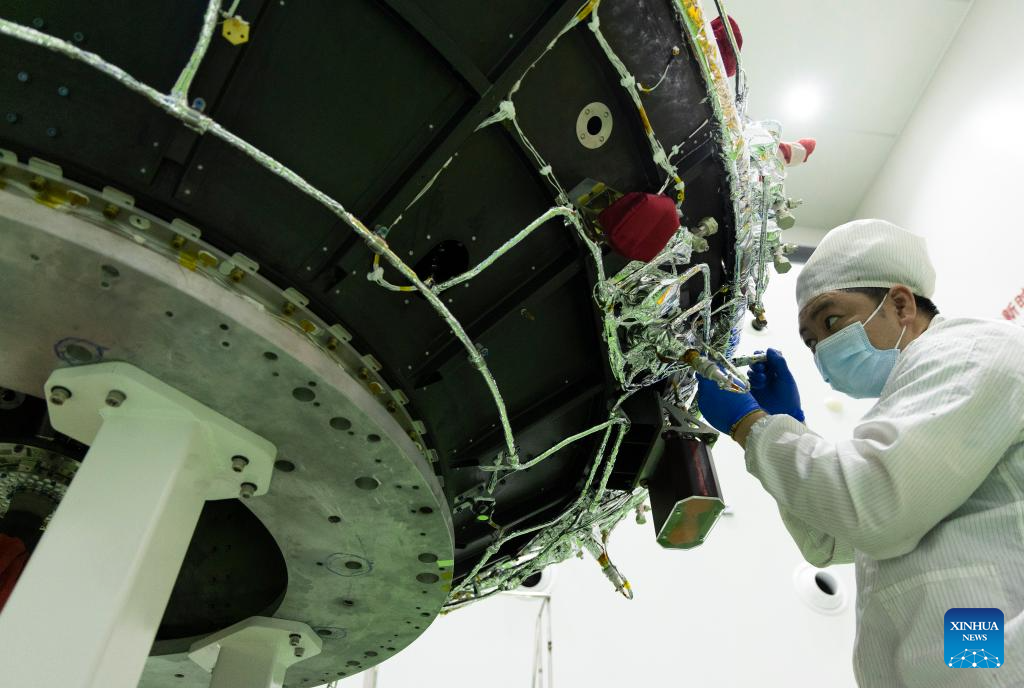
A technician checks the Solar wind Magnetosphere Ionosphere Link Explorer (SMILE) at a workshop of the Innovation Academy for Microsatellites of Chinese Academy of Sciences (CAS) in Shanghai, east China, Nov. 4, 2024. The SMILE is a joint mission between the CAS and the European Space Agency (ESA) that aims to deepen the understanding of the Sun-Earth connection by observing the dynamic interaction between the solar wind and the Earth's magnetosphere.
The SMILE satellite has completed the development work in China, including satellite testing, system interface testing and environmental experiments, according to the National Space Science Center of the CAS.
The SMILE is about to depart for Europe. It is scheduled for launch by the end of 2025 from Europe's space launch site in Kourou, French Guiana, by Arianespace's Vega-C launch vehicle. (Xinhua/Jin Liwang)
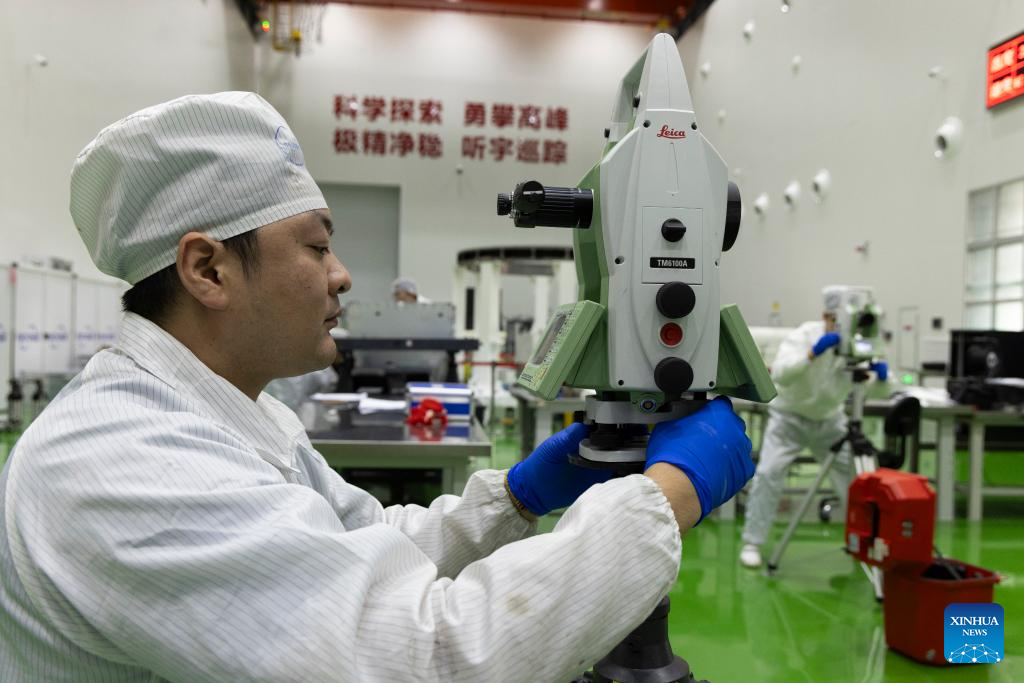
A technician measures the Solar wind Magnetosphere Ionosphere Link Explorer (SMILE) at a workshop of the Innovation Academy for Microsatellites of Chinese Academy of Sciences (CAS) in Shanghai, east China, Nov. 4, 2024. The SMILE is a joint mission between the CAS and the European Space Agency (ESA) that aims to deepen the understanding of the Sun-Earth connection by observing the dynamic interaction between the solar wind and the Earth's magnetosphere.
The SMILE satellite has completed the development work in China, including satellite testing, system interface testing and environmental experiments, according to the National Space Science Center of the CAS.
The SMILE is about to depart for Europe. It is scheduled for launch by the end of 2025 from Europe's space launch site in Kourou, French Guiana, by Arianespace's Vega-C launch vehicle. (Xinhua/Jin Liwang)
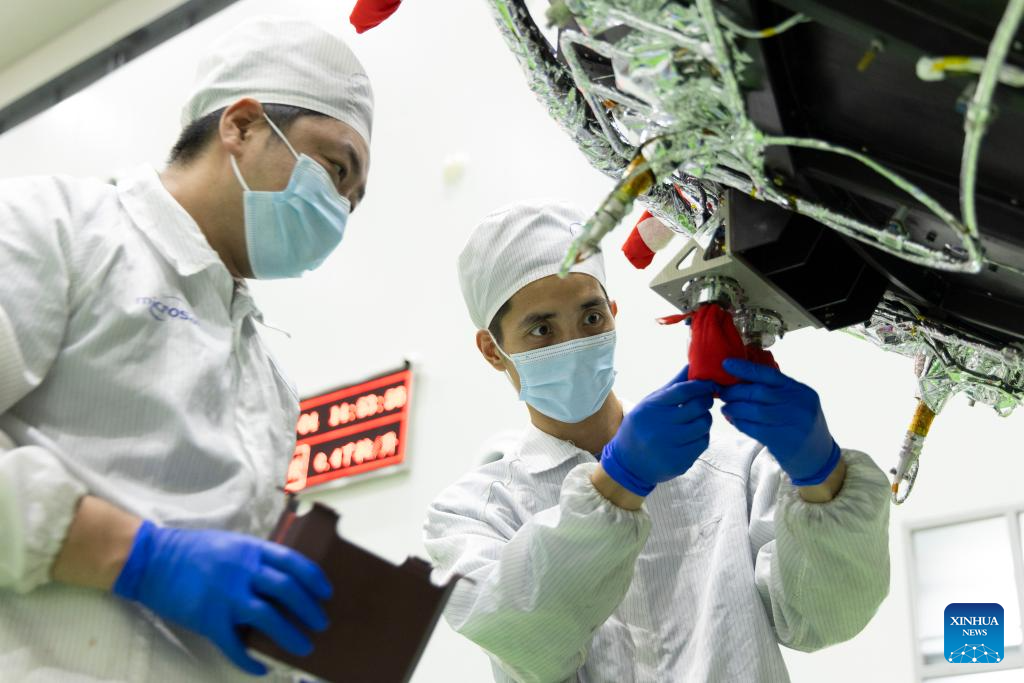
Technicians check the Solar wind Magnetosphere Ionosphere Link Explorer (SMILE) at a workshop of the Innovation Academy for Microsatellites of Chinese Academy of Sciences (CAS) in Shanghai, east China, Nov. 4, 2024. The SMILE is a joint mission between the CAS and the European Space Agency (ESA) that aims to deepen the understanding of the Sun-Earth connection by observing the dynamic interaction between the solar wind and the Earth's magnetosphere.
The SMILE satellite has completed the development work in China, including satellite testing, system interface testing and environmental experiments, according to the National Space Science Center of the CAS.
The SMILE is about to depart for Europe. It is scheduled for launch by the end of 2025 from Europe's space launch site in Kourou, French Guiana, by Arianespace's Vega-C launch vehicle. (Xinhua/Jin Liwang)
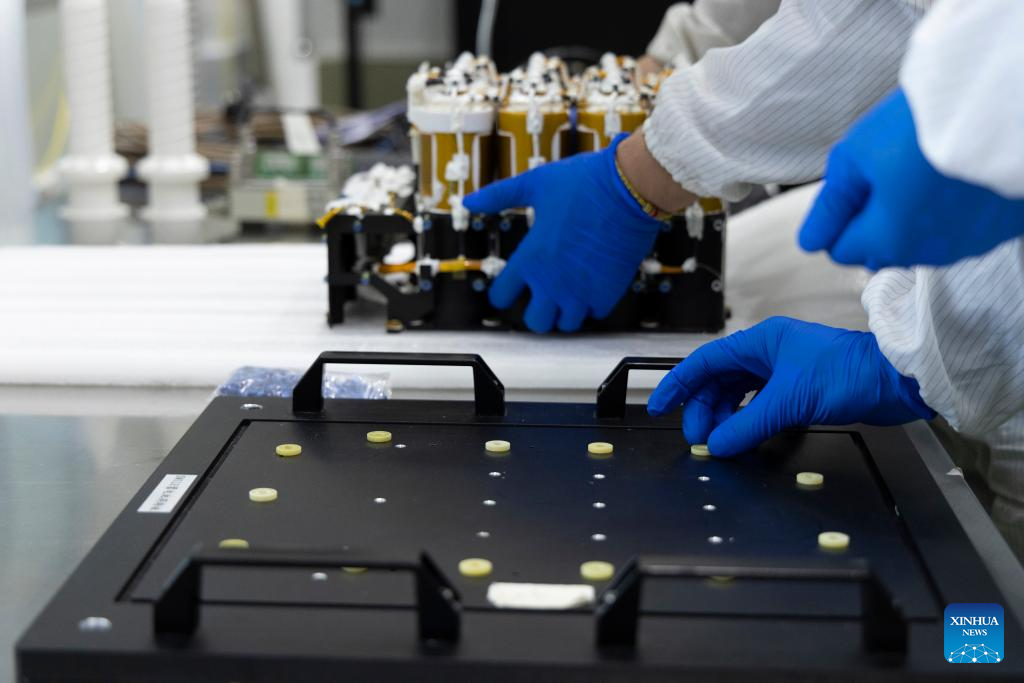
Technicians pack the battery pack of the Solar wind Magnetosphere Ionosphere Link Explorer (SMILE) at a workshop of the Innovation Academy for Microsatellites of Chinese Academy of Sciences (CAS) in Shanghai, east China, Nov. 4, 2024. The SMILE is a joint mission between the CAS and the European Space Agency (ESA) that aims to deepen the understanding of the Sun-Earth connection by observing the dynamic interaction between the solar wind and the Earth's magnetosphere.
The SMILE satellite has completed the development work in China, including satellite testing, system interface testing and environmental experiments, according to the National Space Science Center of the CAS.
The SMILE is about to depart for Europe. It is scheduled for launch by the end of 2025 from Europe's space launch site in Kourou, French Guiana, by Arianespace's Vega-C launch vehicle. (Xinhua/Jin Liwang)
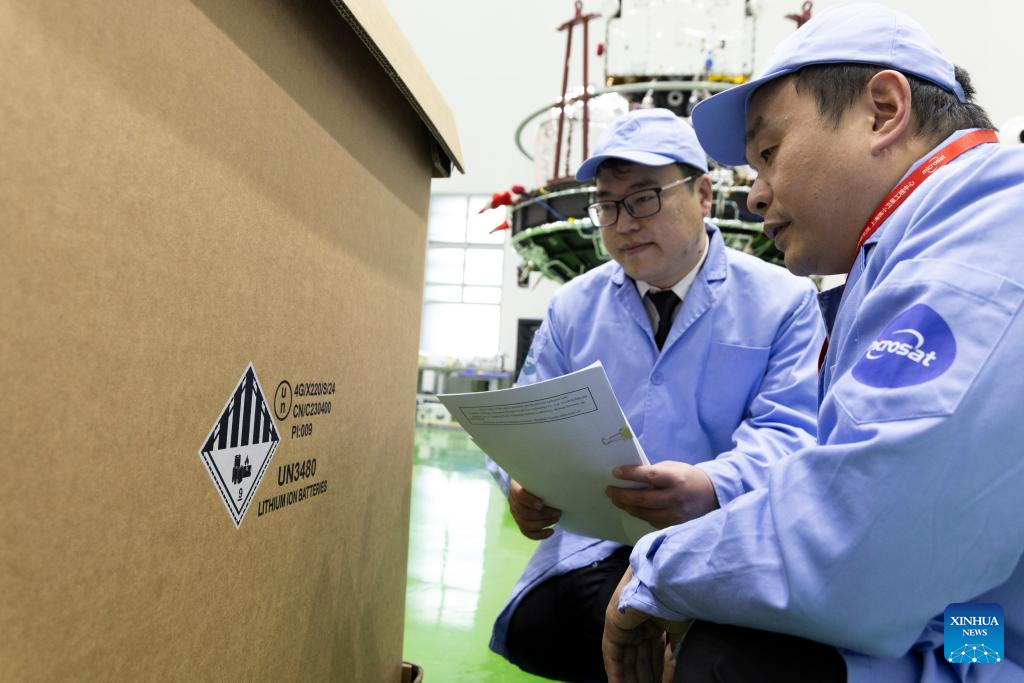
Customs officers check the packages for the Solar wind Magnetosphere Ionosphere Link Explorer (SMILE) at a workshop of the Innovation Academy for Microsatellites of Chinese Academy of Sciences (CAS) in Shanghai, east China, Nov. 4, 2024. The SMILE is a joint mission between the CAS and the European Space Agency (ESA) that aims to deepen the understanding of the Sun-Earth connection by observing the dynamic interaction between the solar wind and the Earth's magnetosphere.
The SMILE satellite has completed the development work in China, including satellite testing, system interface testing and environmental experiments, according to the National Space Science Center of the CAS.
The SMILE is about to depart for Europe. It is scheduled for launch by the end of 2025 from Europe's space launch site in Kourou, French Guiana, by Arianespace's Vega-C launch vehicle. (Xinhua/Jin Liwang)
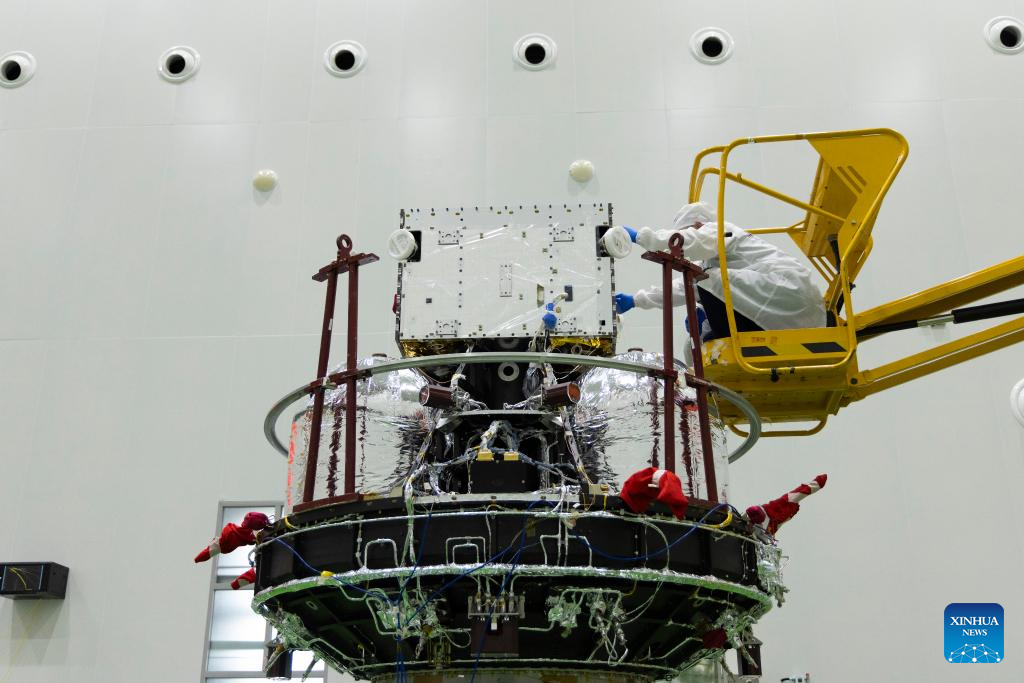
A technician checks the Solar wind Magnetosphere Ionosphere Link Explorer (SMILE) at a workshop of the Innovation Academy for Microsatellites of Chinese Academy of Sciences (CAS) in Shanghai, east China, Nov. 4, 2024. The SMILE is a joint mission between the CAS and the European Space Agency (ESA) that aims to deepen the understanding of the Sun-Earth connection by observing the dynamic interaction between the solar wind and the Earth's magnetosphere.
The SMILE satellite has completed the development work in China, including satellite testing, system interface testing and environmental experiments, according to the National Space Science Center of the CAS.
The SMILE is about to depart for Europe. It is scheduled for launch by the end of 2025 from Europe's space launch site in Kourou, French Guiana, by Arianespace's Vega-C launch vehicle. (Xinhua/Jin Liwang)

A technician packs the battery pack of the Solar wind Magnetosphere Ionosphere Link Explorer (SMILE) at a workshop of the Innovation Academy for Microsatellites of Chinese Academy of Sciences (CAS) in Shanghai, east China, Nov. 4, 2024. The SMILE is a joint mission between the CAS and the European Space Agency (ESA) that aims to deepen the understanding of the Sun-Earth connection by observing the dynamic interaction between the solar wind and the Earth's magnetosphere.
The SMILE satellite has completed the development work in China, including satellite testing, system interface testing and environmental experiments, according to the National Space Science Center of the CAS.
The SMILE is about to depart for Europe. It is scheduled for launch by the end of 2025 from Europe's space launch site in Kourou, French Guiana, by Arianespace's Vega-C launch vehicle. (Xinhua/Jin Liwang)
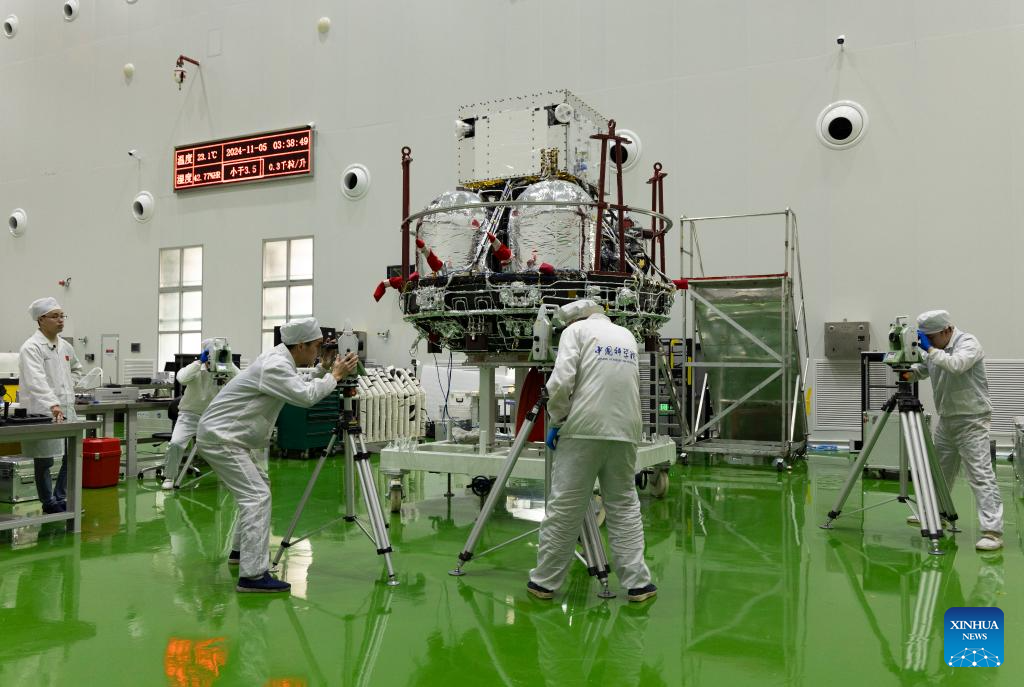
Technicians measure the Solar wind Magnetosphere Ionosphere Link Explorer (SMILE) at a workshop of the Innovation Academy for Microsatellites of Chinese Academy of Sciences (CAS) in Shanghai, east China, Nov. 4, 2024. The SMILE is a joint mission between the CAS and the European Space Agency (ESA) that aims to deepen the understanding of the Sun-Earth connection by observing the dynamic interaction between the solar wind and the Earth's magnetosphere.
The SMILE satellite has completed the development work in China, including satellite testing, system interface testing and environmental experiments, according to the National Space Science Center of the CAS.
The SMILE is about to depart for Europe. It is scheduled for launch by the end of 2025 from Europe's space launch site in Kourou, French Guiana, by Arianespace's Vega-C launch vehicle. (Xinhua/Jin Liwang)
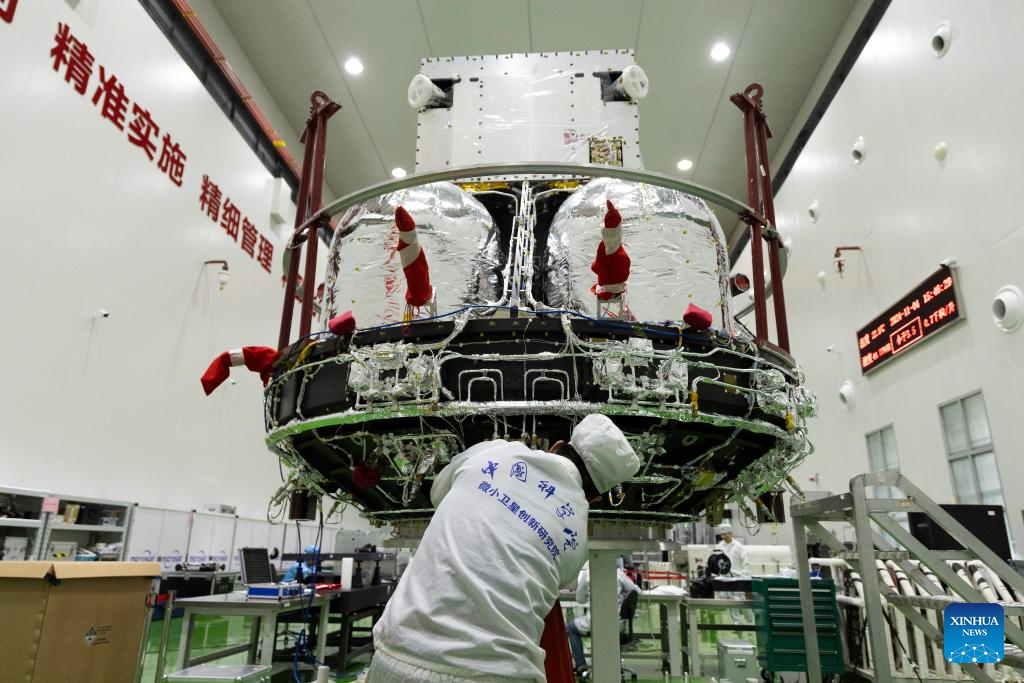
A technician checks the Solar wind Magnetosphere Ionosphere Link Explorer (SMILE) at a workshop of the Innovation Academy for Microsatellites of Chinese Academy of Sciences (CAS) in Shanghai, east China, Nov. 4, 2024. The SMILE is a joint mission between the CAS and the European Space Agency (ESA) that aims to deepen the understanding of the Sun-Earth connection by observing the dynamic interaction between the solar wind and the Earth's magnetosphere.
The SMILE satellite has completed the development work in China, including satellite testing, system interface testing and environmental experiments, according to the National Space Science Center of the CAS.
The SMILE is about to depart for Europe. It is scheduled for launch by the end of 2025 from Europe's space launch site in Kourou, French Guiana, by Arianespace's Vega-C launch vehicle. (Xinhua/Jin Liwang)



